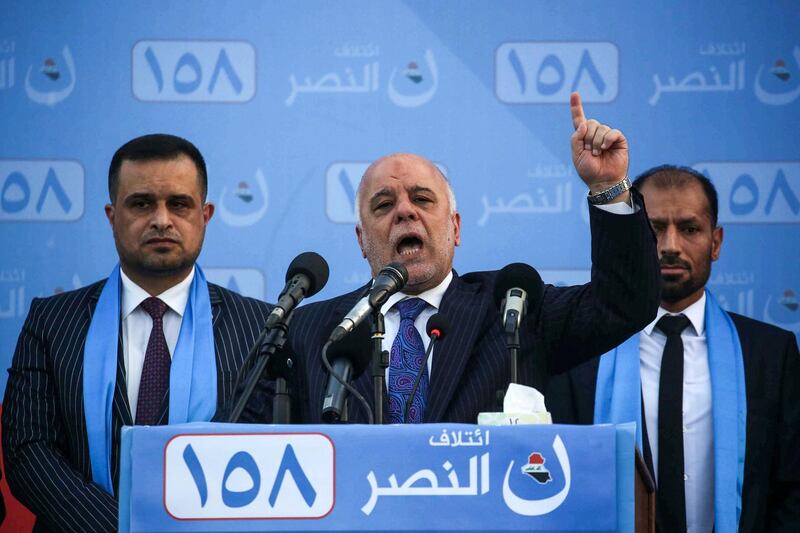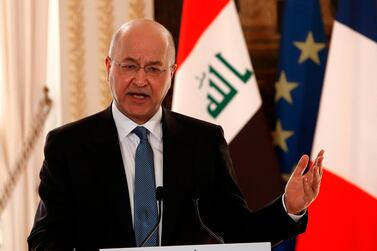Iraqis are outraged over former Prime Minister Haider Al Abadi's remarks that only eight women and children were killed in the battle to retake the northern Iraqi city of Mosul from ISIS.
Security forces backed by heavy coalition firepower descended on Mosul in 2016, Iraq’s second city and the largest ever controlled by the terror group. It took Iraqi forces nine months to combat ISIS, in what was described by US forces the most intense since the Second World War.
Counts of the death toll had varied but estimates indicated that between 9,000 and 11,000 civilians died in the battle, a number 10 times higher than what had been officially reported, the Associated Press said in December 2017.
In a separate investigation, NPR reported that the city morgue had recorded the names of 4,865 individuals on death certificates, dating between October 2016 and July 2017, and estimated that more than 5,000 civilians had been killed.
“They give me numbers of civilians. Every time I asked for the number of women and children,” Mr Al Abadi said said during the sixth annual Sulaimani Forum on Wednesday.
“I’ll give you this data … There were only eight women and children. Eight, only eight, out of 1,400,” the former prime minister said.
The official was challenged by NPR’s international correspondent Jane Arraf who was chairing the discussion.
Ms Arraf responded to former premier’s comments by saying that thousands of civilians were buried under the rubble after they had taken shelter in basements and used as human shields by ISIS.
“I have seen the bodies myself...Bodies of children lying on the ground. There were so many civilians killed in Mosul,” she said.
After surprising exchange with #Iraq ex PM @HaiderAlAbadi telling me only eight women, children killed in battle for Mosul rather than the several thousand documented @AliBaroodi - from Mosul - tells him ‘Mosul voted for you. Don’t disrespect the people of Mosul’ #Suliforum2019
— jane arraf (@janearraf) March 6, 2019
Mr Al Abadi refuted her comments.
Ali Al Baroodi, a university professor and photographer in Mosul, contested the figure with the Iraqi official.
"I told him that I witnessed myself as a photographer, the bodies of women and children," Mr Al Baroodi told The National.
He said that 10 days ago bodies were retrieved from under the rubble in the city.
“I said to Haider Al Abadi that he needs to show respect for the victim’s families and to those Mosulis who voted for him,” Mr Al Baroodi said, referring to residents of the city.
Yes I made it. I went up to the stage & spilled it out. There are thousands of casualties & Old #Mosul was densely populated during the battle. Mosul supported you in the late elections, so victims deserve respect and justice.#SuliForum #SuliForum19 #SuliForum2019 pic.twitter.com/iJa25Cp8dg
— Ali Y. Al-Baroodi (@AliBaroodi) March 6, 2019
Mr Al Mr Abadi responded by saying that he had reliable statistics and asked Mr Al Baroodi for evidence.
“He literally said to me is that really in Mosul?” Mr Al Baroodi siad.
Although Iraq declared victory over the group in 2017, sleeper cells still operate in the country from sparsely populated areas, including desert regions near the border with Syria.
The outrage was further ignited after the current Prime Minister Adel Abdel Mahdi said on Wednesday that drugs are illegally entering the country after being smuggled via Argentina and through Syria.
“The drugs are transferred from Argentina to Arsal, then to Syria, and end up in Iraqi territory,” Mr Abdel Mahdi said.
Iraqi Prime minister @AdilAbdAlMahdi said “drugs enter Iraq from Argentine”. As an Iraqi passport holder I beg Ayatullah @mauriciomacri president of Islamic Republic of Argentine to do something to stop this.
— Dr. Mohammedali Taha (@DrMohammedaliYT) March 7, 2019
The controversy arose after Iraqi border security forces foiled numerous attempts to smuggle drugs from Iran.
Last November, Basra police chief, Rashid Falih said that 80 per cent of the narcotics that enter Basra are from Iran.
Since then security officials have received an approval from the interior ministry to carry out large scale operations to secure Basra’s border with Iran.
His remarks stirred controversy on social media with critics saying they are typical of the Iraqi political elite's disregard for citizens.
Activists circulated a map with the name Argentina as the name of Iran, calling it the "Islamic Republic of Argentina".
رئيس الوزراء العراقي : المخدرات تصل العراق من الارجنتين😂 pic.twitter.com/0NQGvJutTU
— Hussam Alhaj (@HussamAlhaj4) March 6, 2019
"Does Abed Al Mahdi have the courage to say that all the destruction and suffering of Iraq is sourced by Iran?” said Hussam Ali on Twitter.
Iraq is an ally of Iran, and its politics is often dominated by its relations with the neighbouring state.







